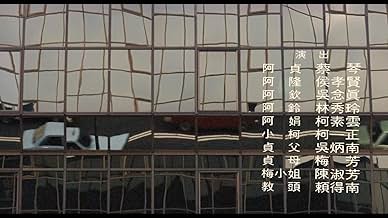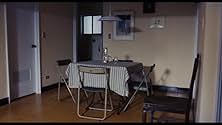Añade un argumento en tu idiomaLung is a former member of the national Little League team who lives with his old childhood sweetheart Ah-chin, a traditional family woman. Although they live together, Ah-chin is weary of L... Leer todoLung is a former member of the national Little League team who lives with his old childhood sweetheart Ah-chin, a traditional family woman. Although they live together, Ah-chin is weary of Lung's past liaison with another girl.Lung is a former member of the national Little League team who lives with his old childhood sweetheart Ah-chin, a traditional family woman. Although they live together, Ah-chin is weary of Lung's past liaison with another girl.
- Premios
- 3 nominaciones en total
Argumento
¿Sabías que...?
- CuriosidadesThis film is part of the Criterion Collection, spine #879.
- Citas
Lung: He killed someone once. A black person. Later the police came and he was acquitted. He said that in the States, if you see a suspicious person in your yard, and if you can shoot them dead, drag them into your house and plant an unregistered gun on them. They call it self-defense. You're not guilty.
- ConexionesFeatured in Century of Cinema: Naamsaang-neuiseung (1996)
Two big names in Taiwan put on their acting chops as leading performers of this film, the first being Tsai Chin the songstress who would go on to become Yang's first wife, and starring opposite her is Hou Hsiao-Hsien, the acclaimed film director whom you would have seen earlier in a more comical (or at least going by the laughs his small role received) part of being part of a management posse. And frankly, he has that tremendous charisma in front of the screen, just that his talents also extend going behind the camera more often than he is in front of one. They play the couple Chin and Lon respectively, where the film opens with the couple looking at an apartment they can call their own. All seems well at first, until the story by Yang, Hou Hsiao-Hsien and Chu Tien-Wen begin to unfold and reveal the cracks that exist beneath.
You're not going to be successful each time you sweep things under the carpet, and here the issues are many which includes a sudden turn of events in the career of Chin, being quite confident about her promotion in the beginning before a forced acquisition of the company she works for meant her position is made redundant. Seeking solace and a listening ear from her boyfriend Lon looked like a tall order, with Lon being preoccupied with trying to assimilate back to society having spent some time in Los Angeles, and struggling to find his identity since he's still stuck in the glorious years of the past with his Lttlle League baseball success. From this point on your suspicion of the lack of intimacy rears its ugly head, as one poignant scene involves Lon just staring blankly at his lover who had mentioned the demise of her career, but you can tell just how badly he wants to go back to the television baseball game, and a recorded one at that.
Chin constantly hiding beind large, and I mean large, sunglasses also makes it difficult for the viewer, and others around her, to gaze into her soul since the eyes hold the key to that, and probably added to her frustration of being misunderstood without knowing she's also partly responsible for that. Hou Hsiao-Hsien on the other hand plays that swaggering protagonist with aplomb, intense and constantly on the edge to give others a piece of his mind or two when they cross him through snide remarks, which ultimately this hot headedness and growing impetuousness will prove to be his downfall, not being able to fulfill the dream he once had with the woman he once loved.
In many ways this urban saga highlighting the troubles, issues and concerns of a working middle class are easily identifiable with even for us folks in Singapore, where many of us are juggling careers with other passions (normally tussling for the limited time we have to spend on them), and the various roles that we play in life, from being a family member, to a friend or a colleague. It's painful to watch as these get put on screen, and those looking for escapism in film will be confronted squarely with what's essentially those issues that one desires to escape from.
Here are people stuck with the roles that they cannot run from, and sometimes societal pressures also mean that one has to help the elders to bail out from their situation in what's essentially a wait-and-see, or to tackle things as they come by, one at a time approach. We can tell how beholden Lon is to Chin's father, and the latter's troubles also mean an additional financial pressure placed on Lon. Then on the relationship front come complications from an ex seeking a divorce, and a fellow co-worker looking for companionship with his own impending divorce - seems like any relationship here in the film is constantly on the rocks, such as Lon's taxi friend whom he runs (literally) into - and these present challenges to what's already a fragile couple waiting for an eruption of emotional and trust issues.
Yang's film seems to suggest these are urban traits inevitable at the pace society's moving, trading rapid economic growth for relationship woes as the people's focus changes direction with different priorities being misplaced. From his earlier work, these issues were explored, and they continue here in more depth since the number of characters are more than halved to allow focus and depth of exploration. I'm already curious and optimistic that more of such themes will pop out in the subsequent films in this retrospect (having read their synopsis) and it does seem bleaker in the road up ahead. Recommended, although personally I'd prefer Yang's first film to this one, probably because this cuts too close to home and reality.
- DICK STEEL
- 5 mar 2011
- Enlace permanente
Selecciones populares
- How long is Taipei Story?Con tecnología de Alexa
Detalles
Taquilla
- Recaudación en Estados Unidos y Canadá
- 12.897 US$
- Fin de semana de estreno en EE. UU. y Canadá
- 7333 US$
- 19 mar 2017
- Recaudación en todo el mundo
- 35.336 US$
Contribuir a esta página






























